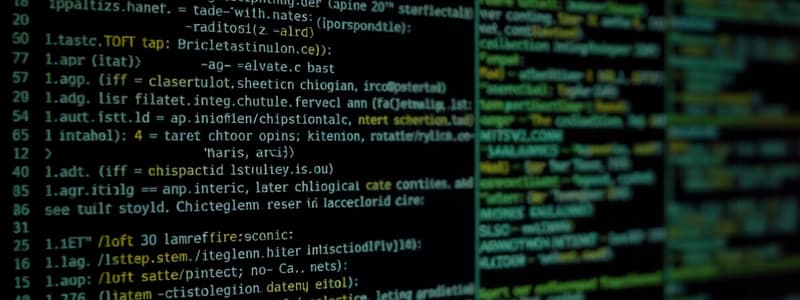Podcast
Questions and Answers
What is the primary benefit of using gets() over scanf() when reading user input in C?
What is the primary benefit of using gets() over scanf() when reading user input in C?
- gets() is faster than scanf()
- gets() allows spaces in user input (correct)
- gets() automatically converts input to integer
- gets() allocates more memory
Which function in C programming is specifically designed to read a single character from the terminal?
Which function in C programming is specifically designed to read a single character from the terminal?
- gets()
- getchar() (correct)
- scanf()
- printf()
Which statement accurately describes the return value of the putchar() function in C?
Which statement accurately describes the return value of the putchar() function in C?
- It returns a string composed of multiple characters
- It does not return any value
- It returns an integer value indicating the length of the string displayed
- It returns the same character that was passed to it (correct)
In which scenario would scanf() yield incomplete input compared to gets()?
In which scenario would scanf() yield incomplete input compared to gets()?
What should be included at the beginning of a C program to utilize printf() and scanf() functions?
What should be included at the beginning of a C program to utilize printf() and scanf() functions?
What will be the result of the expression (A > B) when A holds 10 and B holds 20?
What will be the result of the expression (A > B) when A holds 10 and B holds 20?
Which operator can be used to check if two variables are not equal?
Which operator can be used to check if two variables are not equal?
Using the assignment operator '=', what will the value of A be after the operation A += B if A is initially 10 and B is 20?
Using the assignment operator '=', what will the value of A be after the operation A += B if A is initially 10 and B is 20?
What does the expression (A == B) evaluate to when A is 10 and B is 20?
What does the expression (A == B) evaluate to when A is 10 and B is 20?
In the context of dynamic memory management, which function can be used to allocate memory during runtime?
In the context of dynamic memory management, which function can be used to allocate memory during runtime?
What operator is used to perform a bitwise AND operation on two integer values?
What operator is used to perform a bitwise AND operation on two integer values?
Which unary operator will decrement the value of a variable by 1?
Which unary operator will decrement the value of a variable by 1?
What is the result of applying the logical negation operator '!' to a boolean expression that evaluates to true?
What is the result of applying the logical negation operator '!' to a boolean expression that evaluates to true?
How does the conditional operator '?:' function in an expression?
How does the conditional operator '?:' function in an expression?
What does the bitwise complement operator '~' do to its operand?
What does the bitwise complement operator '~' do to its operand?
What is a key reason the C programming language is considered fast?
What is a key reason the C programming language is considered fast?
Which section of a C program is responsible for including necessary header files?
Which section of a C program is responsible for including necessary header files?
What does the definition section in a C program primarily do?
What does the definition section in a C program primarily do?
What is the role of the global declaration section in a C program?
What is the role of the global declaration section in a C program?
What indicates that every C program must have a main function?
What indicates that every C program must have a main function?
In the context of performance, how does C programming compare with higher-level languages like Python?
In the context of performance, how does C programming compare with higher-level languages like Python?
What aspect allows C language programs to be extended with new features easily?
What aspect allows C language programs to be extended with new features easily?
Which statement accurately describes local variable declaration in C?
Which statement accurately describes local variable declaration in C?
Flashcards are hidden until you start studying
Study Notes
Speed
- C language offers fast compilation and execution times due to fewer built-in functions, resulting in lower overhead.
- Newer languages like Java and Python are feature-rich but have additional processing, which slows their performance compared to C.
- As a middle-level language, C allows direct manipulation of computer hardware, an advantage over higher-level languages.
- Statically typed languages like C are generally faster than dynamically typed ones.
Extensibility
- C language is highly extensible, allowing programmers to add new features to existing programs with ease.
Structure of C Program
- A C program consists of six sections: Documentation, Link, Definition, Global Declaration, Main Function, and Output Function.
Documentation Section
- Contains comment lines for documentation purposes.
Link Section
- Provides instructions for the compiler to link necessary header files (e.g.,
#include).
Definition Section
- Uses
#definedirective for defining symbolic constants (e.g.,#define PI 3.14).
Global Declaration Section
- Includes global variables that can be accessed in multiple functions (e.g.,
float area(float r); int a = 7;).
Main Function Section
- Every C program must have a
main()function, which consists of:- Declaration part
- Executable part (Example:
int main(void) { int a = 10; printf("%d", a); return 0; }).
Input/Output Functions
- Standard I/O functions are available in the
stdio.hheader.
printf() and scanf()
printf(): Used to display output.scanf(): Used to read input from the user (e.g., reads an integer value).
getchar() and putchar()
getchar(): Reads a single character from the terminal.putchar(): Displays a single character on the screen.
Difference Between scanf() and gets()
scanf()halts reading at spaces, whilegets()reads an entire line including spaces.
Operators
- Relational operators include:
==: Checks equality (e.g.,A == B).!=: Checks inequality.>: Greater than.<: Less than.>=: Greater than or equal to.
- Bitwise operators include:
&: Bitwise AND.|: Bitwise OR.^: Bitwise XOR.
- Logical operators include:
&&: Logical AND.||: Logical OR.
- Assignment operators modify the value of variables (e.g.,
+=,-=, etc.). - The
sizeofoperator returns the size of a data type or object.
Input Function
- The input function facilitates data entry into a program.
Studying That Suits You
Use AI to generate personalized quizzes and flashcards to suit your learning preferences.




